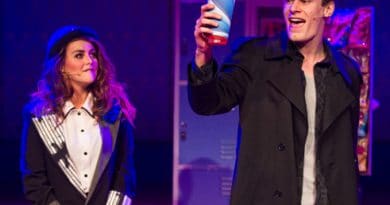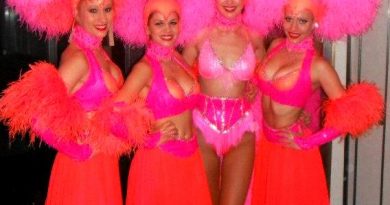The Fantasticks, Hayes Theatre Co
Note: this review frequently references sexual assault. Please be safe.
The Fantasticks, the world’s longest-running musical, inspires a certain fervour in its audiences. Due to close in 2015 after 42 years – and then another 7 – in New York, two anonymous fans donated funds to keep the show running indefinitely. It asks people, somehow, to preserve it – perhaps through its accessibility and ubiquitousness. The show has a pretty, simple score, and is often performed in schools and amateur community theatres, fostering affection in theatre fans from a young age.
The show is the first at the Hayes Theatre for 2016, directed by Helen Dallimore. The Hayes is now the centre of independent and boutique professional musical theatre in Sydney, and its reach is extending nationwide thanks to shows like Sweet Charity, Blood Brothers, Heathers and the upcoming Little Shop of Horrors, which follow the Hayes season with interstate runs. There’s a certain cultural cachet that now comes from playing the Hayes. The Fantasticks has a lot to live up to.
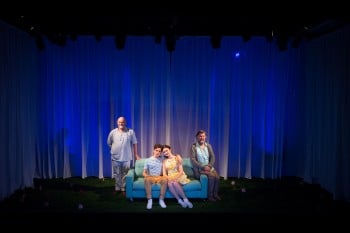
The two young leading players – Bobbie-Jean Henning as Luisa and Jonathan Hickey as Matt – are charming, interesting finds. Henning’s clear top notes lend the production an authenticity and sweetness it would not have had without her; Hickey’s guileless performance is endearing.
At first glance The Fantsasticks seems like an easy choice for the Hayes. It’s small, which means it can be easily translated to the tiny Hayes stage. Its running costs are relatively low, with only a handful of actors and two musicians. Dallimore seemed to be creating something a little new with the show back when it was announced, replacing its traditional piano and harp with guitars and electric keyboard. The result is something like a gentler Tommy.
Along with piano and harp, the show also used to feature a song that used the word rape as a punchline just shy of forty times. The joke is, ostensibly, a play on the idea that ‘rape’ can also mean ‘abduction’ – but that meaning has fallen well out of use in modern society, where we live within a fraught system that blames women for their own sexual assaults and rapes (men can’t control themselves, so ladies, don’t walk alone at night or show too much skin).
The song has since been edited to remove the overt references to rape, and when licensing the show, alternative words have been available since around 1990 – substituting rape for ‘abduction,’ ‘raid,’ or ‘chase.’ Listen to the new off-Broadway take here – it lists the original lyrics below for comparison’s sake.
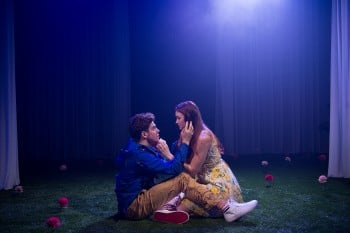
Dallimore’s production uses the original version of the song, which now seems to have a more sinister bent; if other, more sensitive and modern lyrics are used around the world, why on earth would you choose the offensive version for your run in Sydney? In Australia, more than one woman per week dies from domestic violence. In Australia, more than one in five women have been the victim of a sexual assault (this number is likely to be far higher; many victims of sexual assault will not report the crime, for myriad completely understandable reasons).
Later Luisa is almost seduced against her will by hired abductor El Gallo (Martin Crewes); the staging is deliberately sexual and she is clearly not in control or able to consent (there’s a magic mask; it’s hard to explain). Luisa eventually does agree to run away with El Gallo, but when it is her choice she is rebuffed, which is a turning point in the script; Luisa’s decisions become more tempered, more kind. This production hangs less on Luisa’s decisions and instead spends more time and visual cues reveling in her lack of agency, naivete, and exploitable sexuality. Anything else about her is just a footnote.
There is no need for the production to do that. There is no need to continually reduce a young woman to her sexual viability. Luisa is selfish, romantic, unrealistic – her journey towards feeling real compassion and love for another person might come after a moment with El Gallo, but she doesn’t need to be groped over and over to get there.
Dallimore’s production isn’t edgy, it doesn’t simply ‘go too far’ – it’s just frustratingly offensive, and shockingly lazy. Shows don’t need to continue their historically misogynist bents; the majority of musicals might be written by men and frequently reduce their women characters to little more than shells, but in 2016, with a woman director, these issues can be explored and course-corrected in direction and performance. Shows in 2016 can reclaim some dignity for their women and they should – because otherwise, what on earth are you saying with your production? What message are you sending to your audience?
This production, with its constant use of rape as a double entendre, flanked by slapstick, vaudevillian staging and Cameron Mitchell’s retrograde choreography (there’s a ridiculously lazy Native American stereotype in the steps, for example) seems to keep saying: lighten up with your political correctness.
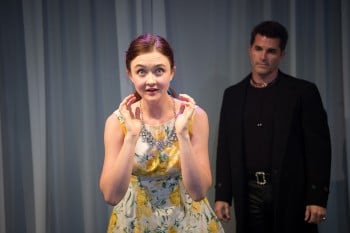
I suspect some of us will lighten up when women’s bodies aren’t casually treated as belonging to the men of the world, both onstage and off.
The Fantasticks, and Dallimore’s production, does not exist outside or above the context of contemporary Sydney society. This production should not and cannot be separated from the world around it. Art is always at its best when it is part of the living, breathing organism of our communities, our countries. You can’t check your politics, your traumas, your privilege or oppression at the door. Those things stay with us. Conviction and reporting rates don’t change because we have turned off our phones and taken our seats. The Fantsasticks could have avoided the worst of its rape references and hints of sexual violence; this production wilfully chose not to.
There’s no language, trigger, or safety warning in the program, at the theatre, or on the website. The Fantasticks seems more concerned about presenting the original text or being controversial than it does about the health of its audience, or about the relevance of its work to those who will see it.
If you were thinking of going, consider yourselves warned.
If you or someone you know is in crisis, you can call The Sexual Assault & Domestic Violence National Help Line any time on 1800 Respect (1800 737 732).


